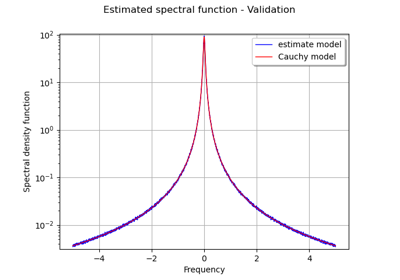SpectralModel¶
- class SpectralModel(*args)¶
Spectral density model.
Methods
computeStandardRepresentative(frequency)Compute the standard representant of the spectral density function.
draw(*args)Draw a specific component of the spectral density function.
Get the amplitude parameter of the spectral density function.
Accessor to the object's name.
getId()Accessor to the object's id.
Accessor to the underlying implementation.
Get the input dimension of the spectral density function.
getName()Accessor to the object's name.
Get the spatial correlation matrix of the spectral density function.
Get the dimension of the SpectralModel.
getScale()Get the scale parameter of the spectral density function.
setAmplitude(amplitude)Set the amplitude parameter of the spectral density function.
setName(name)Accessor to the object's name.
setScale(scale)Set the scale parameter of the spectral density function.
Notes
We consider
a multivariate stochastic process of dimension
, where
is an event,
is a domain of
,
is a multivariate index and
.
We note
the random variable at index
defined by
and
a realization of the process
, for a given
defined by
.
If the process is a second order process, zero-mean and weakly stationary, we define its bilateral spectral density function
with:
is the set of d-dimensional positive hermitian matrices
Using the stationary covariance function
with
and the Fourier transform, the spectral density writes:
A SpectralModel object can be created only through its derived classes:
CauchyModel- __init__(*args)¶
- computeStandardRepresentative(frequency)¶
Compute the standard representant of the spectral density function.
- Parameters:
- taufloat
Frequency value.
- Returns:
- rhoComplex
Standard representant factor of the spectral density function.
Notes
According to definitions in
CovarianceModel, as the spectral density function is the Fourier transform of the stationary covariance function and using the expression of the last one, the spectral density function writes as a matrix-complex product where the matrix is the constant spatial covariance structure and the complex represents the standard representative:Thus,
where
is a covariance matrix that explains the covariance structure and
- draw(*args)¶
Draw a specific component of the spectral density function.
- Parameters:
- rowIndexint,
The row index of the component to draw. Default value is 0.
- columnIndex: int, :math:`0 leq columnIndex < dimension`
The column index of the component to draw. Default value is 0.
- minimumFrequencyfloat
The lower bound of the frequency range over which the model is plotted. Default value is SpectralModel-DefaultMinimumFrequency in
ResourceMap.- maximumFrequencyfloat
The upper bound of the frequency range over which the model is plotted. Default value is SpectralModel-DefaultMaximumFrequency in
ResourceMap.- frequencyNumberint,
The discretization of the frequency range
over which the model is plotted. Default value is SpectralModel-DefaultFrequencyNumber in class:~openturns.ResourceMap.
- modulebool
Flag to tell if module has to be drawn (True) or if it is the argument to be drawn (False). Default value is True.
- rowIndexint,
- Returns:
- graphGraph
Graphic of the specified component
- getAmplitude()¶
Get the amplitude parameter of the spectral density function.
- Returns:
- amplitude
Point The used amplitude parameter.
- amplitude
- getClassName()¶
Accessor to the object’s name.
- Returns:
- class_namestr
The object class name (object.__class__.__name__).
- getId()¶
Accessor to the object’s id.
- Returns:
- idint
Internal unique identifier.
- getImplementation()¶
Accessor to the underlying implementation.
- Returns:
- implImplementation
A copy of the underlying implementation object.
- getInputDimension()¶
Get the input dimension of the spectral density function.
- Returns:
- inputDimensionint
SpatialDimension of the SpectralModel.
- getName()¶
Accessor to the object’s name.
- Returns:
- namestr
The name of the object.
- getOutputCorrelation()¶
Get the spatial correlation matrix of the spectral density function.
- Returns:
- spatialCorrelation
CorrelationMatrix Correlation matrix
.
- spatialCorrelation
- getOutputDimension()¶
Get the dimension of the SpectralModel.
- Returns:
- dimensionint
Dimension of the SpectralModel.
- getScale()¶
Get the scale parameter of the spectral density function.
- Returns:
- scale
Point The used scale parameter.
- scale
- setAmplitude(amplitude)¶
Set the amplitude parameter of the spectral density function.
- Parameters:
- amplitude
Point The amplitude parameter to be used in the spectral density function.
- amplitude
- setName(name)¶
Accessor to the object’s name.
- Parameters:
- namestr
The name of the object.
 OpenTURNS
OpenTURNS
